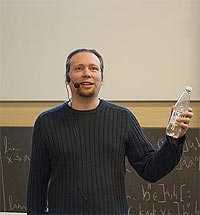After Facebook visit, studying looks like work
University research and education laboratory Software Factory has launched a new kind of Open Source collaboration with the software industry and leading universities like Stanford University and MIT.
How do we keep students engaged until graduation, and how could young people be offered something they cannot already learn at work? These are big enough challenges for more than one university.
– When I think about working life and my own experiences of it, this start in Silicon Valley definitely boosted my motivation to study, says computer science student Janne Laukkanen.
He recently returned from a study-related field trip to San Francisco.
By providing working-life connections through education and research, the Department of Computer Science offers one answer to the question. And its newest means to connect started in 2010 with Software Factory, which has now networked both within Finland and across the globe.
Software Factory's newest collaboration centers on Open Source, and launched with a Hackathon event at Facebook's San Francisco campus in late January. More than 150 students from around 10 universities participated.
– With collaborators from Stanford University, MIT, University of Tokyo, National University of Singapore, and other universities in China, USA, Canada, and Europe, our students are in good company and the experience is unique, says laboratory operational coordinator Fabian Fagerholm.
Working online, student teams participate in development efforts like the well-known Ruby on Rails application framework and the Kotlin programming language compiler project.
– Especially this close collaboration with top developers from the Open Source world is hard to get elsewhere. Many of these developers are legends in their own communities. During our trip, we worked hand in hand under their instruction, says student Olli Rissanen.
University-level theory and relevant practice through international collaboration
The idea of Open Source projects is to offer students a unique learning experience, and also to try out new teaching methods.
Department Head of Studies Jaakko Kurhila is enthusiastic:
– More of this is needed all the time. Students who want something extra in their degree, and are willing to put in the work, will benefit from this tremendously.
– Students learn teamwork and skills that are difficult to convey in traditional lectures. Software Factory is also an excellent environment for conducting empirical research, says FiDiPro professor Jürgen Münch, who leads the Software Systems Engineering Research Group at the University of Helsinki.
The Open Source endeavor ends in June 2013. After that, participating universities will use the experience in developing their own computer science education.
Software Systems Engineering Research Group
Course description: Software Factory Project
Text: Minna Meriläinen-Tenhu
31.1.2013

 The instruction at the Department of Computer Science continues in the limelight; this time in the form of personal recognition, as the student union at the University of Helsinki has awarded the Magister Bonus prize of 2011 to University Lecturer Matti Luukkainen. Matti was interviewed about teaching and studying by Ella Peltonen from TKO-äly immediately after the festivities.
The instruction at the Department of Computer Science continues in the limelight; this time in the form of personal recognition, as the student union at the University of Helsinki has awarded the Magister Bonus prize of 2011 to University Lecturer Matti Luukkainen. Matti was interviewed about teaching and studying by Ella Peltonen from TKO-äly immediately after the festivities. As announced by Nokia on Thursday 22 September 2011, Henry Tirri had been appointed Chief Technology Officer at Nokia and Executive Vice President of the Nokia Leadership Team, effective from that date. According to the bulletin, ‘As Chief Technology Officer, Tirri assumes responsibility for the CTO organization, charged with setting Nokia's technology agenda both now and in the future, and driving core innovation to enable business development opportunities.”
As announced by Nokia on Thursday 22 September 2011, Henry Tirri had been appointed Chief Technology Officer at Nokia and Executive Vice President of the Nokia Leadership Team, effective from that date. According to the bulletin, ‘As Chief Technology Officer, Tirri assumes responsibility for the CTO organization, charged with setting Nokia's technology agenda both now and in the future, and driving core innovation to enable business development opportunities.” The Linkki centre opened at the Helsinki University Department of Computer Science last Friday. The centre offers all kinds of fun activities like games programming, and an online programming course open to all upper-secondary students, starting at the beginning of next year.
The Linkki centre opened at the Helsinki University Department of Computer Science last Friday. The centre offers all kinds of fun activities like games programming, and an online programming course open to all upper-secondary students, starting at the beginning of next year.